
The crowd gathers in the square in front of the pavilion in Recaredo Briceño park in Nicoya. Among the tumult, a girl riding her dad’s shoulders yells enthusiastically at President Rodrigo Chaves. From the stage, he greets her and the rest of the Guanacastecans who welcome him amid songs, shouts and bombas (traditional rhyming limericks with a punchline).
“Long live Chaves!, I love you, Chaves!” shouts the young 13 year-old, dressed up in traditional clothing and jewelry. Her shout is one of many that seem to praise the president on his first visit to the province after being elected. In April of 2022, Guanacaste bet on him, giving him the victory with 55.49% of the votes.
Before the second round, the poll by the Center for Research and Political Studies (CIEP-UCR for the Spanish acronym) calculated that only 38.6% of Guanacastecans would vote for him. On election day, the candidate, who had been accused of sexual harassment by former co-workers and who had lashed out at the press, managed to convince a large part of the undecided voters.
Citizens, diplomats, tourists and journalists fill the square in downtown Nicoya, which has been immersed in dances and festivities for five days for the 198th anniversary of the annexation of the Party of Nicoya to the country. The same square welcomes the current president every year, sometimes shouting with excitement and other times, shouting with complaints.
The place is surrounded by tape that says “do not enter,” canopies for shade, police and an exorbitant amount of people struggling to get up in front of the platform. Since there are so many people, it feels like this square is ten times its size. The more you submerge yourself in the sea of onlookers, the more you hear remarks like, “Now we really do have a president, papa” and “God bless you” directed toward Chaves.
Speakers blare from the stalls around the square too, with songs like Caballito Nicoyano and La Coyolera. From time to time, a Guanacastecan shout is also heard on the horizon. Nicoya hasn’t been so full and alive since before the COVID-19 health crisis.
The president has arrived in a province thirsting for job sources, economic recovery and citizen security. For the first quarter of this year, the Chorotega region had an unemployment rate of 13.1%. In addition, so far this year, OIJ has recorded 32 homicides in the province, a 68% increase compared to the same period last year.
The pandemic dealt a blow to tourism, one of the most important economic sources in the province. In 2020, the Guanacaste airport went 170 days without any aircraft arriving and, although it recovered pre-pandemic traffic levels in June of 2021, it wasn’t until April of 2022 that it managed to surpass them.
At each entrance to the pavilion, there are a dozen police officers led by the director of the Public Force, Daniel Calderon, and the commotion of vendors selling donuts, corn rice and achiote chicken to tourists who are visiting the canton.
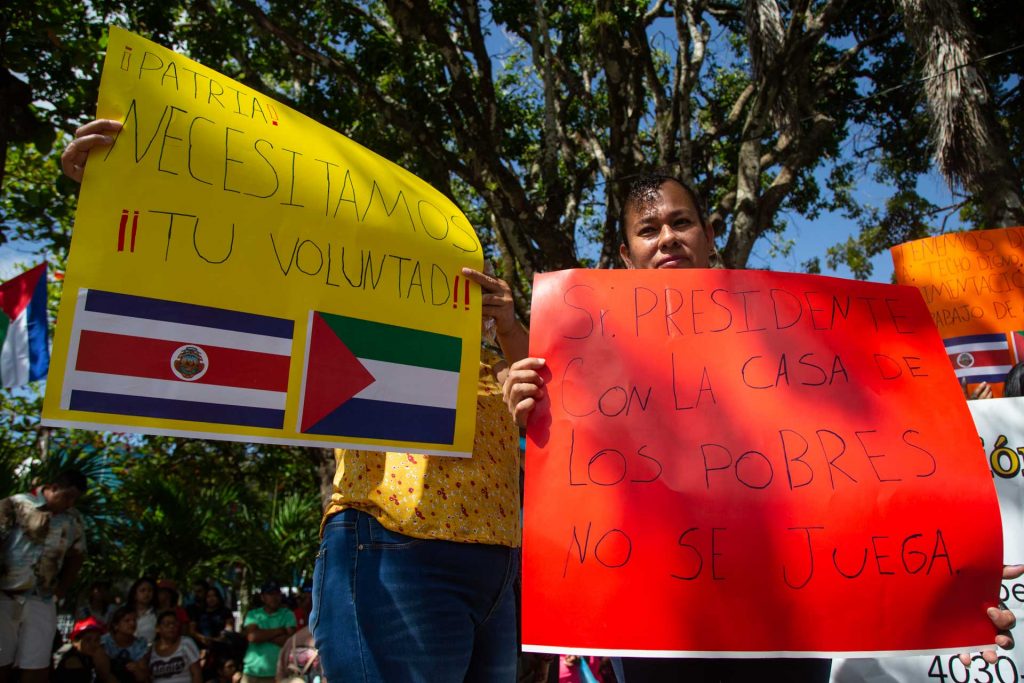
Few people expressed their concerns in front of the Government Council. Representatives came from areas of the peninsula and from housing organizations in Liberia. Photo: Cesar Arroyo Castro.
Today is the last day of a tour throughout Guanacaste whose official soundtrack was a chorus of chants such as “now we have a president” and “we believe in you, Rodrigo.” Citizens filled these days with letters, hugs, dances and offerings. “This president deserves the best because he gives us the best,” says painter Miguel Alan.
Once they take the stage, the ministers will come forward one by one for the next two hours to list the work that their institutions are doing— or that they have already been doing since the previous administration— for the province.
But the speeches are the least of it to spectators on this hot July morning. The crowd is distracted when the ministers talk about data, but they jump with excitement when any of the hierarchs tries to make the famous Guanacastecan shout or recite a bomba. It’s like a variety show with the president’s speech as the final act.
***
Miguel Alan is standing at the edge of the platform, between the television cameras. He says that since Rodrigo Chaves took office, his painting business is doing well and he can sleep better.
Alan, 58, says that the first sign of confidence that the president gave him was eliminating mandatory masks. In this way, he believes, he showed that COVID-19 was “just an excuse to slow down the economy.” A study by the Observatory of the International Labor Organization (ILO) explains that this economic recovery comes more from the gradual reopening of the previous administration as the number of vaccinated people increased.
Alan also believes that Chaves will continue putting “the house in order” and that this means a better life for him. He hastily confesses that in the first round of the elections, he supported Greivin Moya, but since February, he has been an admirer and faithful follower of Chaves.
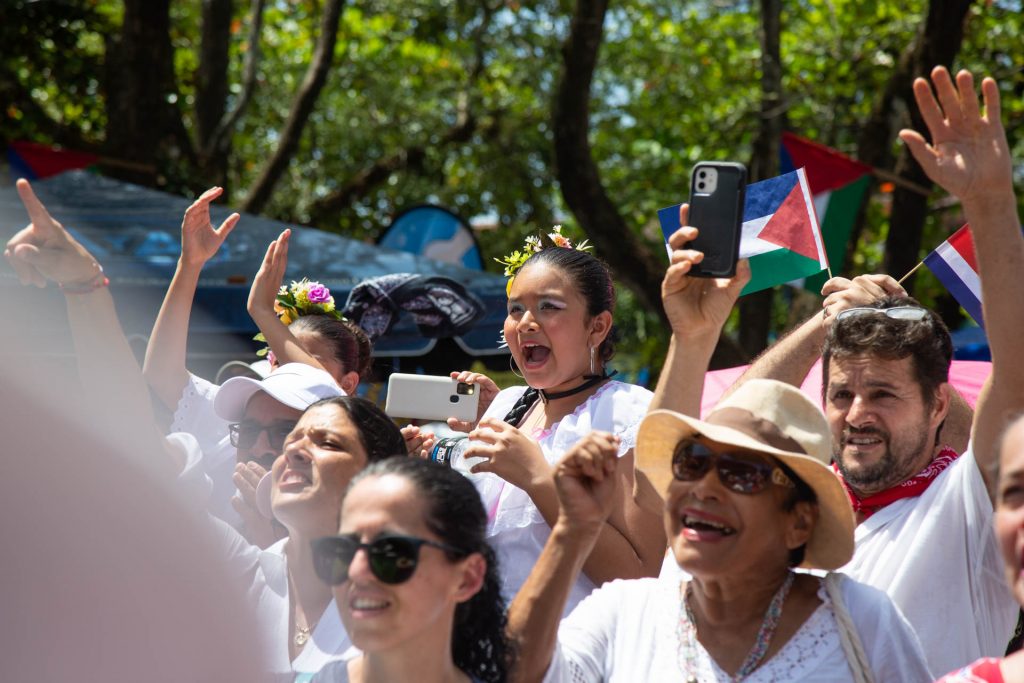
The President’s supporters shout with excitement, applaud and record their videos with the sun beating down. Photo: Cesar Arroyo Castro
“He’s the best president in the world,” he says with almost religious fervor, adjusting his blue hat from the Social Democratic Progress Party, the president’s party.
Near Miguel is Olga Mendoza, a retired educator from Liberia, who tries to get the president’s attention throughout the event with songs and shouts. Olga is dressed in a red and black checkered shirt and a traditional black cowboy hat. She has come to Nicoya to visit some relatives during the Monday holiday, but also to give the president a letter with complaints she has about the hospital in Liberia.
She says that she trusts in Chaves because this is the first president who gives her confidence about the future. “He has shown that he’s truly interested in the people,” she comments, without specifying much more.
A little farther away is Rafael Angel Meneses, sitting on a small wall to the left of the pavilion. “I support him 100%,” the man says, referring to the president. Meneses made a very long journey to see this speech, traveling all the way from downtown Puntarenas.
Meneses thinks that Chaves did choose the right people to lead the ministries, and that’s what gives him more confidence. In addition, he says that he likes that the president “doesn’t have political experience,” but rather that he comes from the field of economics, such as his position at the World Bank. Chaves, however, did hold a political position as Minister of Finance in 2020.
There are some groups making petitions. As happens when administrations are just taking office, the protests were almost non-existent and the few organized groups only came to make requests and not complaints: Green Agenda Forum with the theme of the peninsular districts, the Liberian Housing Association (ASOLIVI for the Spanish acronym) and the Esperanza del Verbo Vivo Housing Association of Guanacaste expounding on accessible credits for housing in Liberia.
Days earlier, community leaders such as Wilmar Matarrita stated that they would not hold demonstrations against the government, since they considered it important to give him the “benefit of the doubt” during this first year.
***
After presentations by Minister of Health Joselyn Chacon, Minister of Economy, Industry and Commerce Francisco Gamboa, and Minister of Housing Jessica Martinez, the sounds of Nicoya pick up again. Some teenage marimba players from Leonidas Briceño School get into position at the foot of the pavilion to play what they say they have been practicing since January.
Next to them, there is a group of girls with traditional Guanacastecan dresses dancing. One of them, without prior notice, goes up on stage to bring Chaves out on the dance floor. The public erupts in applause and shouts once again while the president stomps his feet and moves his hands as if he were playing maracas next to the girl. “That wasn’t in the protocol,” says the president as he returns to his seat smiling.
Once seated, Chaves sees the opportunity to promise that he will appoint a commission to organize “a huge party” during the Annexation bicentennial. Together with the Minister of Culture, Guanacastecan Nayuribe Guadamuz, they sign a decree to create the commission, they show it to the public and Guadamuz lets out a couple of Guanacastecan shouts.
The protocol begins to slip away as the president converses with people in the audience trying to get his attention. He allows them to get up on stage: first a girl brings him a letter with drawings, another person asks him to sign the shirt he is wearing and finally a group of deaf people go up to congratulate him on his support for that community, while he tries to answer them in Costa Rican Sign Language (LESCO for the Spanish acronym).
Chaves knows that they’re getting behind schedule, but he says that “there’s time for everyone.” “I’ll never forget that the province of Guanacaste, these dignified and wonderful people, poured out their confidence in me to occupy the presidential seat.” The people shout, while some throw themselves in front of the pavilion to see him closer up.
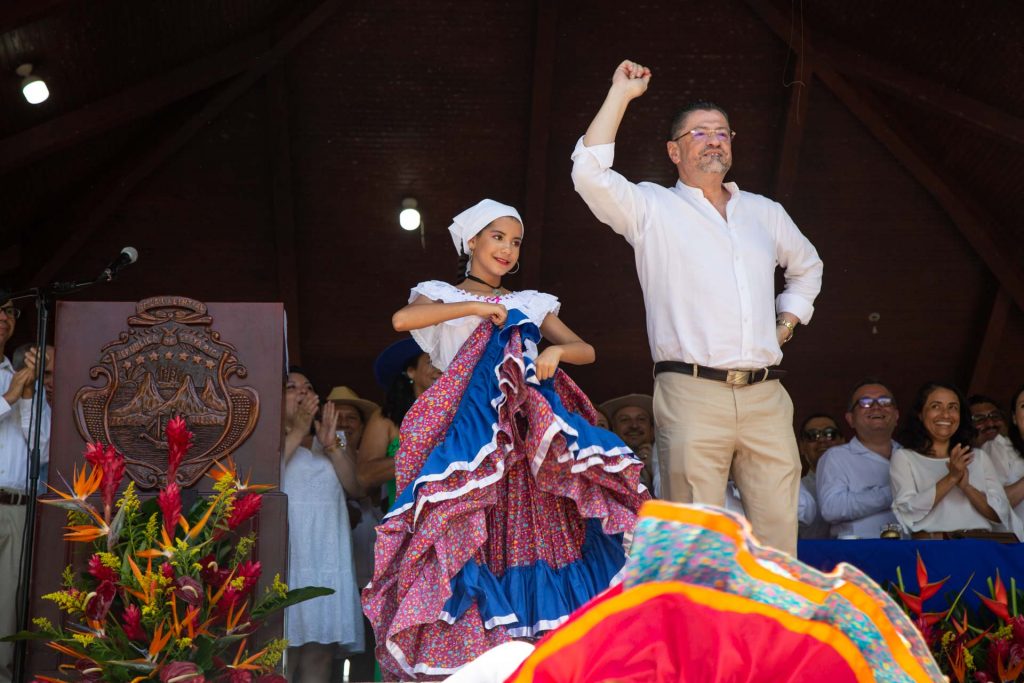
Rodrigo Chaves stomps his feet dancing along with a girl during the Government Council, before giving his first speech in Nicoya. “That wasn’t in the protocol,” he said. Photo: Cesar Arroyo Castro
He makes references to God, to the elections and to the neglect that Guanacaste experienced, according to him, from his predecessors. “Despite all this, for decades, this province has been subjected to being forgotten. But do you know what?” Chaves asks while the public responds with another “What?”
Being forgotten is overcome by forgetting it, disdaining it,” he emphasizes in the midst of a shower of applause that doesn’t stop.
Chaves talks about meetings he held with tourism and transnational companies interested in the province, he talks briefly about Guanacastecan entrepreneurs and the Coca Cola plant under the previous administration.
The president also mentions that in four months, during November, he will return to Guanacaste together with the ministers to present updates on projects for the province, although he doesn’t mention which ones.
Chaves doesn’t raise the tone of his voice until he speaks directly to the few legislators sitting under a canopy on the right side of the plaza, from parties like National Liberation and Christian Social Unity. He clenches his fists and yells:
Do the patriotic thing. Legislators, approve the Eurobonds. Don’t play games! Don’t play games! (People shouts and claps are heard in the background). That isn’t disrespectful, Legislative Assembly. It’s a patriotic call to [do] your responsibility. Stop playing games. Or rather, don’t start,” he demands.
Eurobonds are public debt bonds offered by the government to the international market and the legislators are the only ones who can authorize their issuance. The Chaves administration needs this bill to be approved before next January to cover the payment of $1 billion of a debt acquired during the administration of Laura Chinchilla.
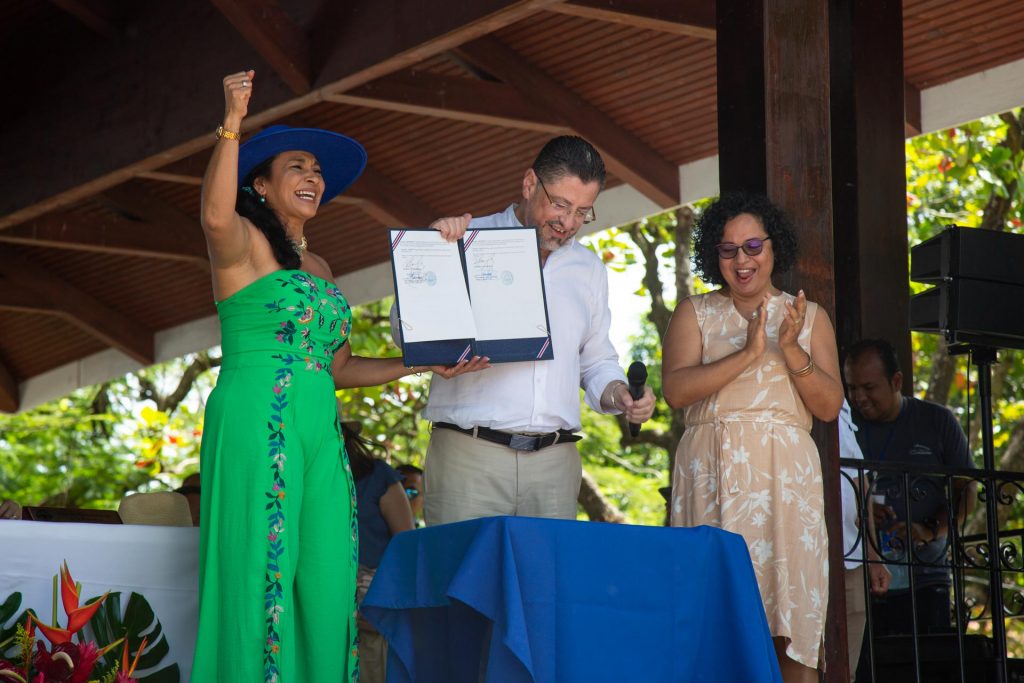
The Minister of Culture and Youth and the President present the signing of the decree to form a commission that will be in charge of organizing the party to celebrate the 200th anniversary of the Annexation of the Party of Nicoya. Photo: Cesar Arroyo Castro
Although the majority of the legislators have indicated that they’re willing to vote in favor of the bill, legislators from some parties such as Broad Front and the Christian Social Unity Party (PUSC for the Spanish acronym) indicate that they’ll vote for it on the condition that the bill include accountability and transparency during the issuance of the bonds.
Chaves waves Guanacaste’s flag and the event ends with the singing of Guanacaste’s anthem, an explosion of applause and Guanacastecan shouts. By now, it’s already 11 a.m. Both the legislators and the ministers struggle to sing the melody. Some don’t sing the lyrics in time with the rhythm of the melody and others read it to get the words right.
A few minutes later, the president comes down to the public, taking cards, shaking hands with men and women who push and shove their bodies against each other to touch him and a few carrying a baby.
The overflowing love continues for several hours, when he participates in the extraordinary session of the Municipal Council of Nicoya, during which he gives another short speech, repeating the promises he made in the morning
Leaving the colonial church, the applause and praise continue, until an adviser indicates that they have to leave and he fervently bids farewell to his admirers. “Long live Chaves! Long live Chaves!” say the spectators as the president gets into the pickup truck. In this way, promising hope to each Guanacastecan palm that reaches him, he ends his first tour in the province. And the people can only have trust.


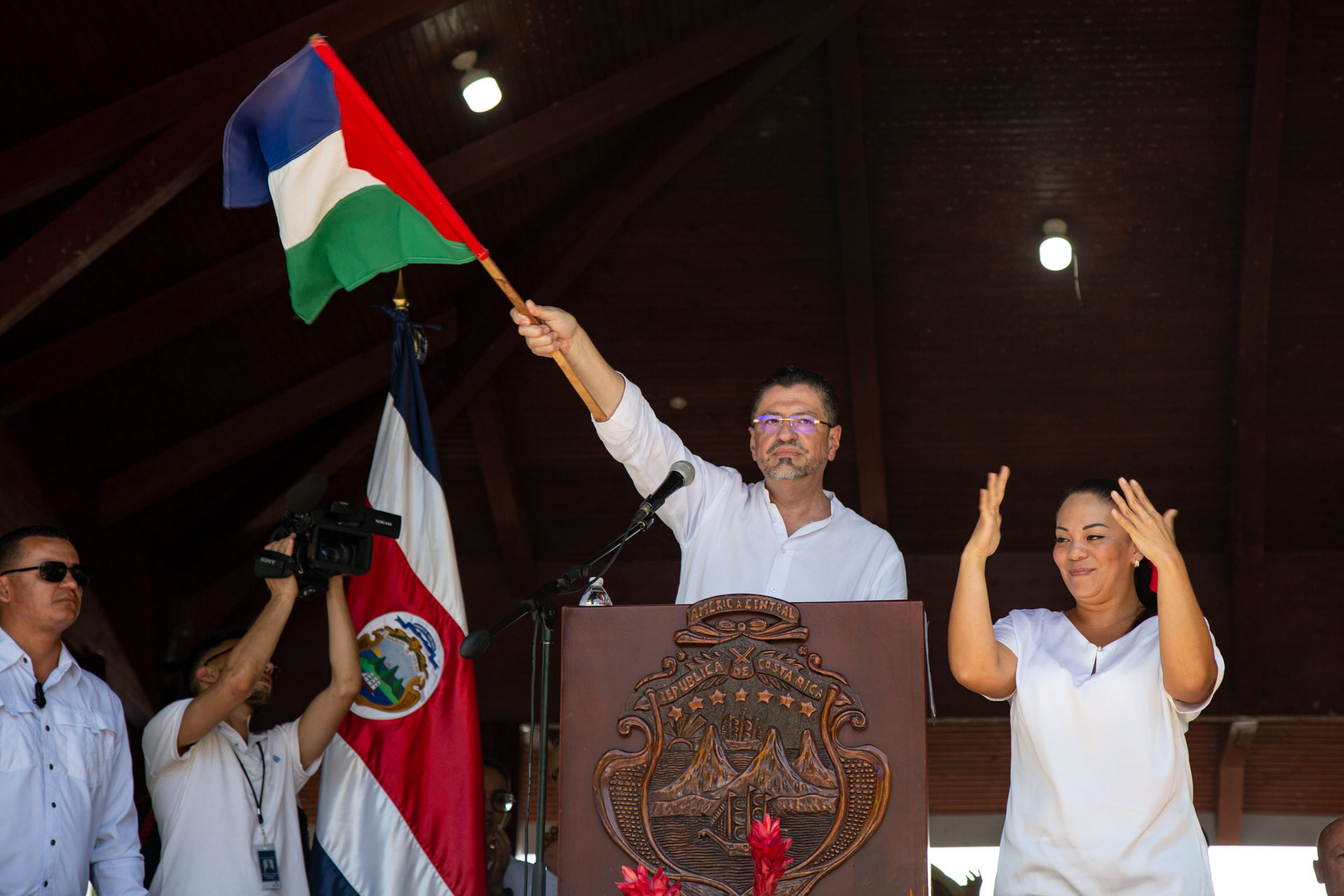
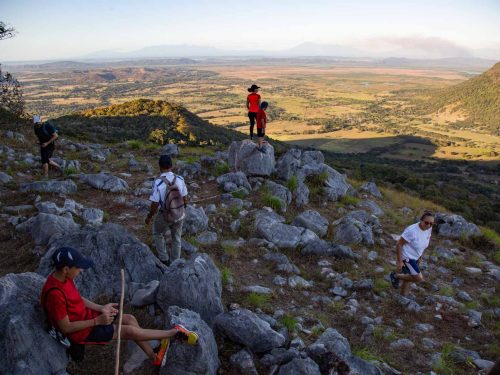
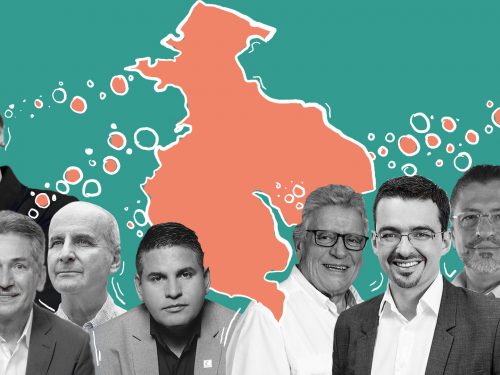
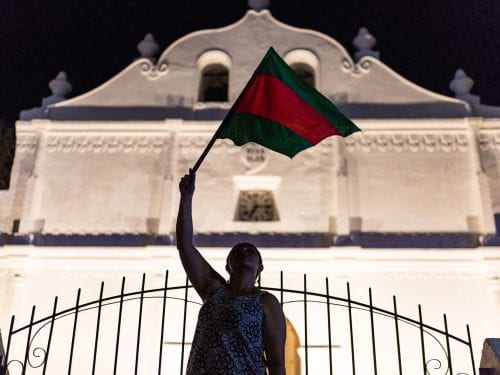

Comments